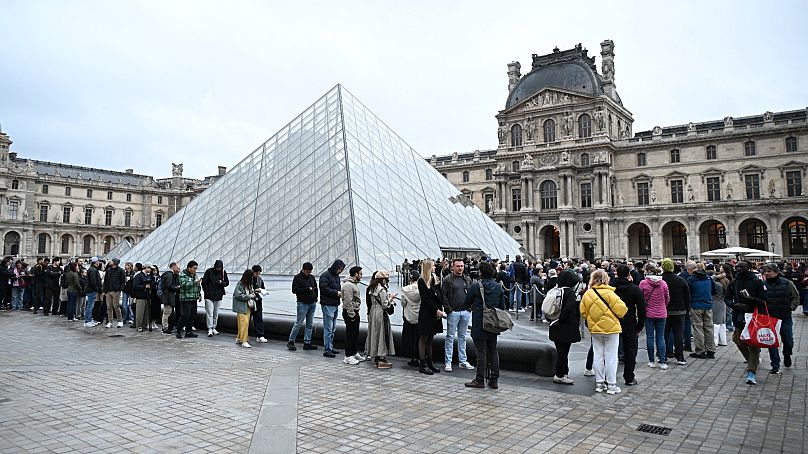Dominique Buffin, the head of security at the Louvre, the world's most visited museum, is facing calls to resign as the hunt continues for the gang of four thieves who carried out what's been dubbed the 'heist of the decade'.
A fresh round of finger pointing is underway in France over who is to blame for what's the audacious daylight heist of the country's crown jewels from the Louvre on Sunday.
The head of security at the world's most visited museum, Dominique Buffin, is facing calls to quit as the hunt continues for the gang of four thieves who carried out the unprecedented crime.
On Monday night, officials from the Culture and Interior ministries met to discuss security measures and review protections in place at other cultural institutions across the country.
Officials say the Louvre raid lasted around seven minutes in total, with the perpetrators spending less than four minutes inside the building.
Inside the Louvre's Apollo Gallery forensic teams have been sifting for signs which could help them track down the team and recover the stolen items.
Lines of inquiry
According to security experts there are three main possibilities that police are pursuing: a gang carrying out a special commission; trained professionals who've exploited the museum's weakness or a 'foreign' state looking to inflict the maximum embarrassement.
The latter explanation may appear somewhat far-fetched and more at home in the realms of a Hollywood movie, but during the first 48-hours after such a raid, experts say it's too early to rule out any line of inquiry.
There is widespread agreement, however, that the jewels are now unlikely to be found intact.
Lawyer and art recovery investigator, Christopher A. Marinello, says authorities will be questioning anyone who had previous links to jewellery thefts and similar raids in the past.
In 2019, CGI, an Israeli private investigation firm helped German police catch criminals who broke into Dresden's Green vault, one of the world's oldest museums, and made off with diamond-studded royal jewels worth hundreds of millions of euros.
The same company is now understood to be helping French detectives.
But Marinello doesn't believe the priceless haul was snatched to satisfy the whims of an extremely rich 'mysterious' figure.
"I have never seen a theft to order case. They chose these jewels because they figured that they could break them apart, take out the settings, take out the diamonds and the sapphires and the emeralds and take them to Israel, take to Antwerp, India find a dodgy dealer that's willing to recut them and no one would ever know what they did."
Soft security costs
Other security experts have pointed out that the Paris Louvre has suffered from having its poor infrastructure well-publicised, which, combined with making the site safe and easily accessible to the public, makes it a fairly soft target.
Jean-Jacques Richard, a global security consultant, believes extra measures could have been taken but round the clock high-tech automatic and manual surveillance requires funding.
"There are perimeter protection devices that react to the movements or vibrations, the reinforced glass quality, random and regular patrols along with drills for timed interventions, all that can make a substantial difference," says Richard.
"Yes, there's a price to pay for security but the absence of sufficient measures also has a cost when objects of national heritage disappear, and, or in the worst case scenario lives are lost. In the raid of the Louvre, not only have priceless objects gone missing, but the very image of France has been tarnished," adds Richard.
Sentiments not surprisingly shared by France's Culture Minister Rachida Dati who told lawmakers in the National Assembly on Tuesday that there was no failure of security on Sunday.
But she did admit it was a painful blow for the nation.
The robbery was “a wound for all of us," she said. "Why? Because the Louvre is far more than the world’s largest museum. It’s a showcase for our French culture and our shared patrimony.”
Eight objects were taken, according to officials: a sapphire diadem, necklace and single earring from a matching set linked to 19th-century French queens Marie-Amélie and Hortense; an emerald necklace and earrings from the matching set of Empress Marie-Louise, Napoleon Bonaparte’s second wife; a reliquary brooch; and Empress Eugénie’s diadem and her large corsage-bow brooch, a prized 19th-century imperial ensemble.













